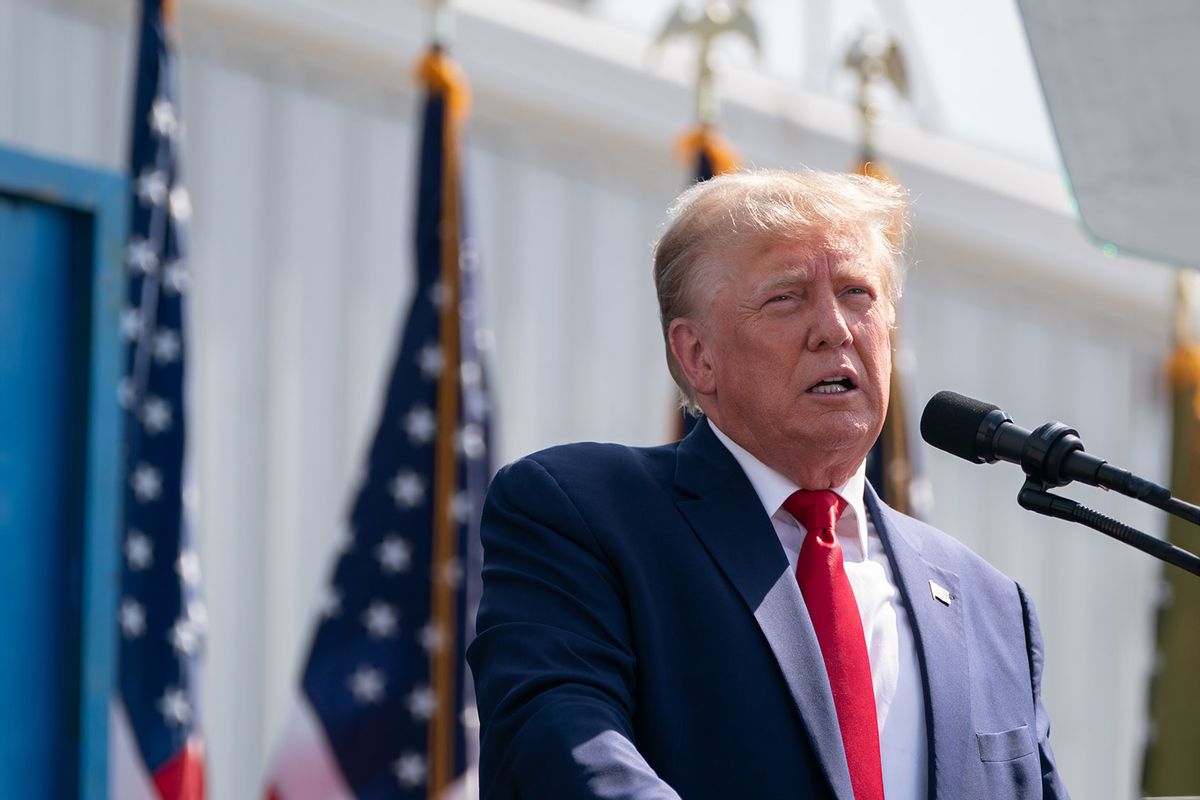Donald Trump's legal team submitted a petition Wednesday night asking a federal judge to halt “all proceedings” in the former president's election interference case, arguing that he has “presidential immunity” from being prosecuted for his acts in office.
Trump lawyer John Lauro asked U.S. District Judge Tanya Chutkan for a complete stay until the question of presidential immunity is “fully resolved.”
Federal prosecutors have resisted Trump's efforts to dismiss election conspiracy charges by arguing that he "is not above the law," and should not be granted immunity for actions he took during his tenure in the White House.
Trump, who is facing four separate criminal cases, has used various delay tactics to prolong the legal process.
In his recent submission, Trump contends that the president should be free to serve without fearing future prosecution from political rivals, citing legal sources like the Federalist Papers and the key Supreme Court case Nixon v. Fitzgerald.
This case established “an extremely deferential rule of immunity, holding that a president is immune for any actions arguably falling within the scope of his official duties, so long as they are not outside the ‘outer perimeter’ of those job responsibilities as president,” Norman Eisen of the Brookings Institution and Joshua Kolb, a former law clerk for the Senate Judiciary Committee, wrote in an op-ed at CNN.
But granting Trump’s request for immunity would not only “derail the case,” it would also “elevate future presidents above the law,” they argued.
Trump has also made other claims, the experts explained, like implying that since the federal executive branch has the responsibility to ensure that federal elections are lawful and as the leader of this branch, he was exercising an unquestioned federal authority in his actions related to the 2020 election. For this reason, he argues, that he shouldn't be subject to prosecution based under the principles of presidential immunity.
But such arguments about executive privilege appear, for the most part, to be asserted in “uncharted territory,” trial attorney Bernard Alexander told Salon.
“Trump's basic claim, boiled down to its essence, is that he was above the law because he heads the branch responsible for enforcing election law,” Alexander said. “Under that logic, a president seeking to thwart the will of the electorate would never be subject to prosecution for sedition or insurrection. There would be no accountability.”
We need your help to stay independent
Referring to Title 18 of the U.S. Code, which addresses matters like treason, rebellion, and similar offenses, sedition is defined as the federal crime of advocating for an uprising against or overthrow of the government through speech, publication, or organization, he explained.
“The conduct in attacking Congress on January 6th appears to qualify as such conduct,” Alexander said. “The Insurrection Act of 1807 is a United States federal law that empowers the president of the United States to deploy U.S. military and federalized National Guard troops within the United States in particular circumstances, such as to suppress civil disorder, insurrection, or rebellion.”
In this instance, the acts of January 6 were “encouraged” by Trump, he added. As the president and leader of the federal executive branch, he “may have been engaged in sedition,” and neglected to suppress insurrection. Such acts would appear to help him achieve the goal of remaining President of the United States.
Want a daily wrap-up of all the news and commentary Salon has to offer? Subscribe to our morning newsletter, Crash Course.
While the Constitution is “hazy” on a lot of things, on this point it’s abundantly clear, Justin Levitt, a professor at Loyola Marymount University Law School, told Salon. Trump’s argument is “charitably, complete nonsense,” he said.
The states are in charge of the conduct of federal elections, except to the extent to which Congress overrides those state choices. Congress has created several federal laws that regulate how federal elections are run, but all of those are enforced by the Department of Justice through the court system, Levitt pointed out.
“Nothing that Trump was doing in 2020 was derived from any power that Congress gave, and therefore not in furtherance of any lawful presidential power; when he was in court, he was in court as Donald J. Trump and not as the United States (to the extent he was involved in any court cases after 2020, they were all filed by his campaign team, not by the DOJ), and when he was on phone calls looking to ‘find’ votes or conspiring to send in fake electors, that was entirely as a candidate and not as the President, because the President has no role in reviewing state election returns or sending in a state’s choice of electors,” Levitt said. “The indictments have been exceedingly clear about basing the charges only on private behavior, and not on anything legitimately governmental.”
Trump’s team has already shown their interest in delaying the proceedings however they can, but the prosecution and the judge have recognized that, he added.
"By advancing these arguments, President Trump is testing the boundaries of presidential power: whether and the extent to which presidents and ex-presidents can be held accountable for actions that, for ordinary citizens (many of whom have now been convicted), would be a clear violation of the law," Alexander said.
The former president has pleaded not guilty to any of the charges. The trial in the case is slated to begin on March 4, 2024, in Washington, D.C.
Read more
about Trump's D.C. case
- "Strongly undermines any claim": Experts say damning NY trial doc could blow up Trump's D.C. defense
- Experts: Trump already "in violation" of D.C. gag order — and may “spend a night or weekend in jail"
- "It's done, he's going to be convicted": Christie says Mark Meadows poses "deadly" threat to Trump
- Trump explodes in late-night Truth Social rant after Judge Chutkan reimposes gag order
- Legal experts: Trump may have already “violated” gag order minutes after judge reimposed it



Shares